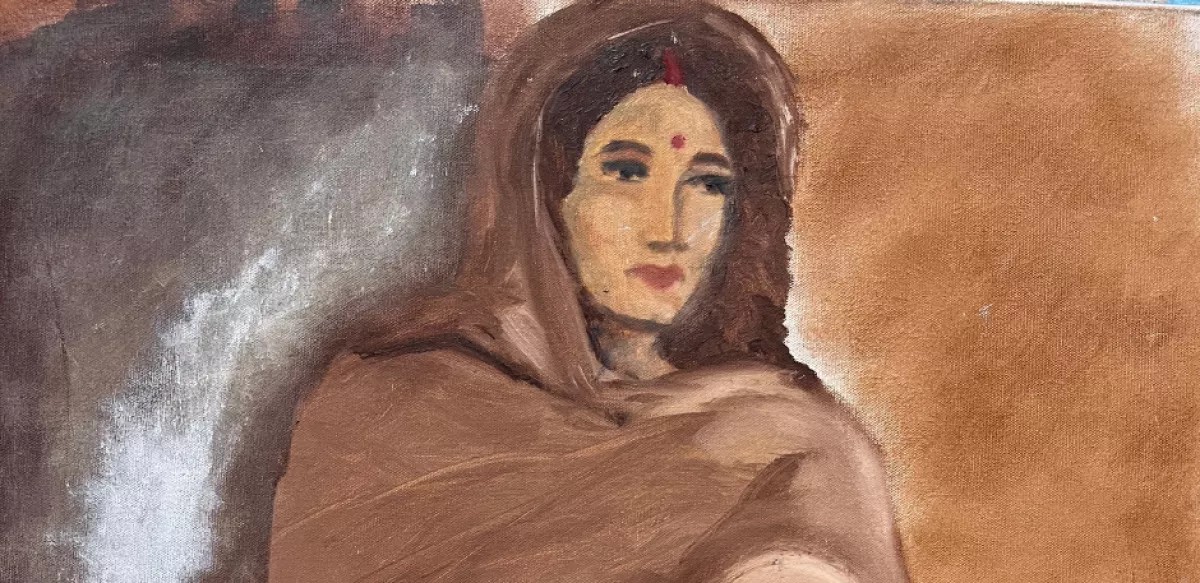The below article has been written by Dr. Sandhya Ramanujam and was also published in
The San Diego Union Trubune website.
Link for the published article given below
https://www.sandiegouniontribune.com/opinion/commentary/story/2023-03-07/opinion-i-help-women-leave-toxic-situations-and-secure-their-safety-their-journey-takes-courage
Photo Credit:
“Warmth” by artist and domestic violence survivor Tanya Momi(Artwork by Tanya Momi)
When I began my career as a dentist, I did not anticipate it would lead to helping victims of abuse.
In 2021, an Indian woman I would later meet at SD Nari, the San Diego nonprofit that supports South Asian survivors of domestic violence, left with her husband of seven years for a holiday in Cancun, Mexico.
The couple and their sons aged 4 and 2 checked into a resort for a week’s vacation. She had looked forward to the break.
Her marriage was rocky. Her husband had fits of bad temper and occasionally hit her. Her parents had told her “to adjust” for her children’s sake. In traditional homes, that’s what “good Indian wives” do. She hoped the vacation would give her a reprieve.
Next morning her husband went to get breakfast. He was gone all day. The worried woman tried to reach him, but her calls went straight to his voicemail. Her husband never came back.
Two days later, he called to say that he was leaving the marriage and that she should return to India. She was stuck in Mexico, without passports, money or a flight back to San Diego.
That day, the woman became a victim of transnational abandonment — a form of domestic violence in which husbands dump abused wives abroad as a way of dissolving a marriage, without paying them a dime.
She is now one of my clients. My role as a counselor at SD Nari is to get women like her out of toxic situations and secure their immediate safety.
Her story is a familiar one. Like several survivors at SD Nari, she had married her non-resident Indian, or NRI, husband in a marriage arranged by her family. A year later, in 2015, she arrived in the United States, a young Indian bride within reach of the American dream.
She imagined a happy life filled with laughter and children. In a foreign land, she placed her trust in her new husband. When a mild episode of violence occurred during a fight, she brushed it aside as an irrational and impulsive act of anger, no harm meant. But then, another incident followed, and another.
When I began my career as a dentist, I did not anticipate it would lead to helping victims of abuse.
I grew up in an Indian household where women were respected as equals. My spiritually inclined parents taught my sister and me to stand up to injustice. That had a powerful influence on me.
In my dentist’s chair, patients will often share confidences that make me wonder about the human mind and why people act in certain ways. That curiosity sent me back to the classroom. I studied counseling psychology, and trained in behavioral sciences, hypnotherapy and regression. I hoped to help people find their inner power to tackle issues and realize that life’s remote control is in their hands.
When I moved to San Diego in 2019, that concept traveled with me.
Now, I practice dentistry four days a week and volunteer at SD Nari on Fridays and weekends.
In my sessions with her, the woman who was abandoned in Mexico realized that her husband had taken advantage of her limited English language skills to coerce and control her. She had signed documents she could not read. He had held on to her passport and jewelry. He forbade her from making friends.
After her abandonment in Mexico, she called her uncle in India. He arranged for her and her two children to procure emergency passports from the embassy.
At SD Nari, we receive an alarming three to four distress calls a day, and we know that survivors need quick access to shelters, safe housing, affordable legal representation, jobs, financial security and transportation. We understand the cultural context and Indian values that force women like my client to endure injustice for as long as they do.
As violent outbursts against them increase in frequency, these women begin to believe it’s their fault. They don’t have friends to turn to. They don’t report incidents to the police for fear of publicly shaming their husband. They stay silent even though they fear for their safety.
It terrifies me to see women still being subjected to such injustice in this day and age. As a mother of two, I want my daughter to respect her worth and my son to treat women as equals.
From a psychological standpoint, I have to deal with culturally ingrained stereotypes. Often, women in a constantly abusive relationship lose trust in themselves. I focus on nurturing them to regain faith in being a spouse, a partner, a mother, and most importantly, a person in their own right.
Women must recognize that they deserve respect and can walk out of a toxic relationship.
That journey to healing takes courage and self-love.

